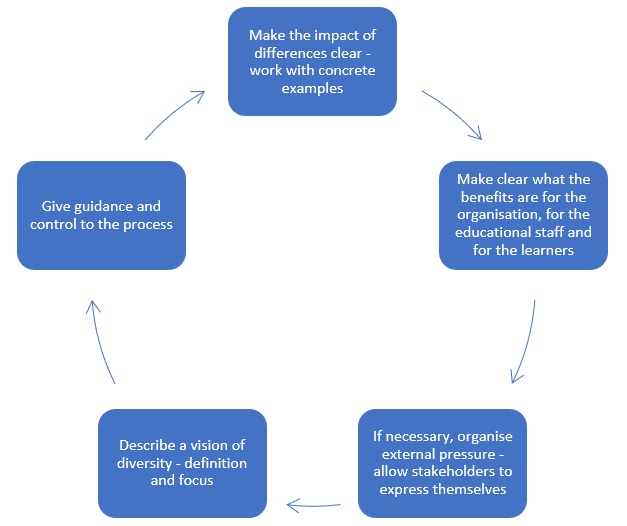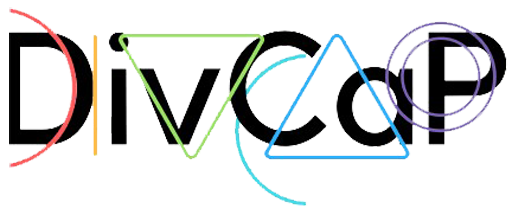Why is it important to stand by the organisation’s diversity policy?
Introduction
Why should a person’s gender, or the fact that a person has a colour, or a disability, determine whether or not she/he is allowed to hold a position?
Organisations can have different reasons to start working with diversity policy:
- Economic arguments are that more profit is made if broader client groups are reached
- An organisational argument is to counter conflicts or intimidation on the work floor, or to use the diversity in teams in a positive way to increase the resolving ability and thus better serve the customers
- Legal arguments are, for example, compliance with quality requirements, guidelines and legislation
- Moral-ethical arguments concern, for example, ‘equal opportunities thinking’, or wanting to be a reflection of society in order not to lose legitimacy in society.
For every organisation, the motives for starting a diversity policy must be clear. Only then will there be a willingness to invest in a change process.
What is Diversity Policy?
This is policy within an organisation, aimed at recognising and valuing differences among people (employees and customers), in order to achieve the most efficient and effective realisation of organisational objectives.
Within an organisation, usually a few pioneers are enthusiastically working on the theme of diversity. They may have different reasons for doing so. After a few conversations with the manager and colleagues, it turns out that it is not easy to get the rest to share the enthusiasm.
Without a problem awareness, it is difficult to initiate a change process. The need for diversity policy is not evident. Willingness only emerges when there is a prevailing feeling in the organisation that there are issues that need to be removed.
How can a sense of urgency be developed?

It starts with defining the concept of diversity.
Diversity is, of course, a broad concept: people can differ on an infinite number of aspects.
Diversity is primarily about dealing with differences in:
- values
- attitudes
- culture
- beliefs
- religion
- ethnic background
- gender
- sexual orientation
- age
- knowledge
- skills
- disabilities
- life experience.
However, it is not only about differences.
It is also about dealing with discrepancies:
- poor versus rich
- young versus old
- men versus women
- black versus white, etc.
Also new contradictions have arisen during the course of time:
- literate versus illiterate
- at-risk versus privileged groups
- those who have access to internet and social media and those who don’t
- people in need of care and people who can take care of themselves.
Diversity is also about have’s and have nots.
Moreover, diversity is related to having access to, not being discriminated against and not being excluded. Diversity is strongly linked to equity: equal chances, equal treatment and equal remuneration.
Finally, diversity is also dealing with contradictions such as preferential policy, positive discrimination, politically correct thinking and acting. It is not only a dialogue of consensus, but also of dissensus.
In practice, a focus on certain forms of diversity is necessary to make real progress. For example, the organization can choose to focus on difference in origin and sexual orientation because these are the areas where most progress is expected. Secondly, it is necessary to determine which organisational units the policy focuses on. A common mistake made by organizations considering implementing diversity policy is that they focus on either human resource policy or service provision. However, a combined approach that focuses on both personnel, customers and the way diversity is managed, can offer the organization the greatest added value.
The Project DivCap
Intends to increase the awareness about diversity issues at a personal and organisational level in adult education organisation.
Wants to introduce concrete measures to promote inclusion and diversity on organisational level.
Aims to augment personal competences of staff of adult education organisations in dealing with diversity.
DivCap will guide in reflecting on the diversity policy in your organisation through:
- Helping with desk research by using the project’s questionnaire
- Preparing interviews with key-persons in your organisation
- Helping with communication and intervention strategies (TOPOI model)
- Setting up a case study of your organisation
- Defining where your organisation currently is (7 Stages model)
- Choosing the right management change approach (Colour Print model)
- Draw up recommendations
- Set up a plan of action
- Supporting (quality measurement)
